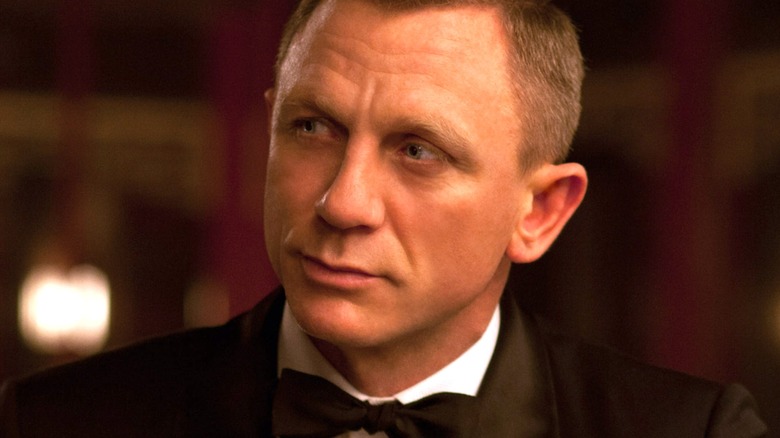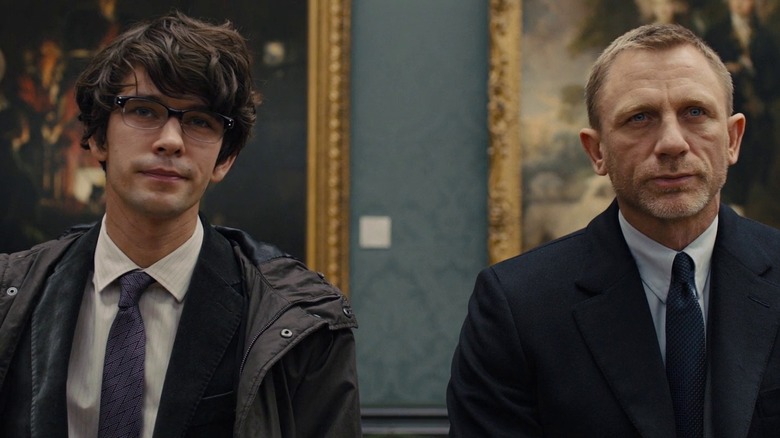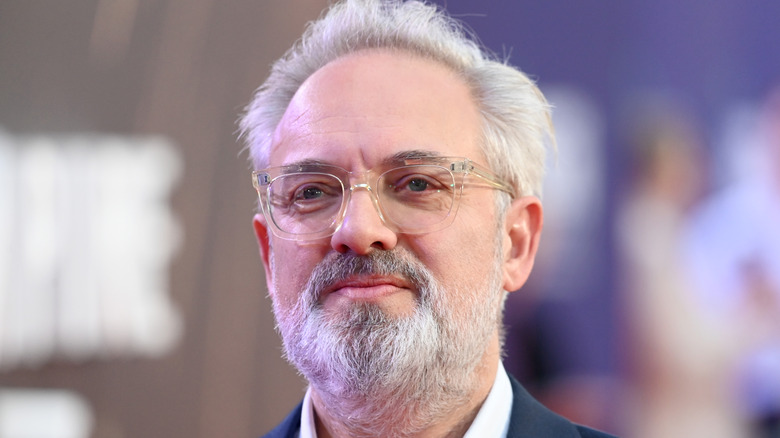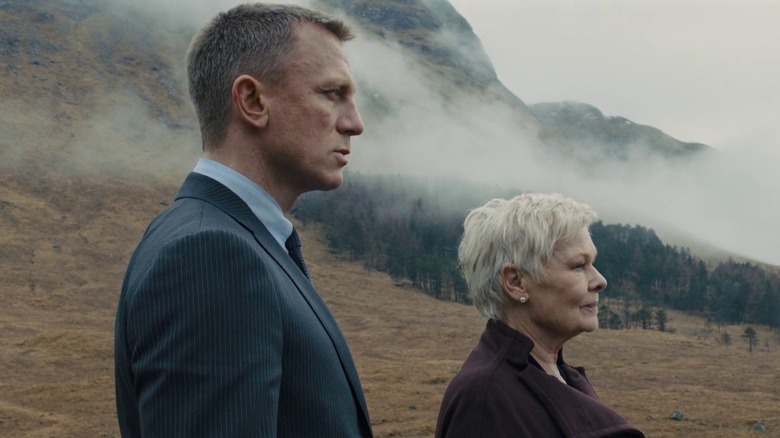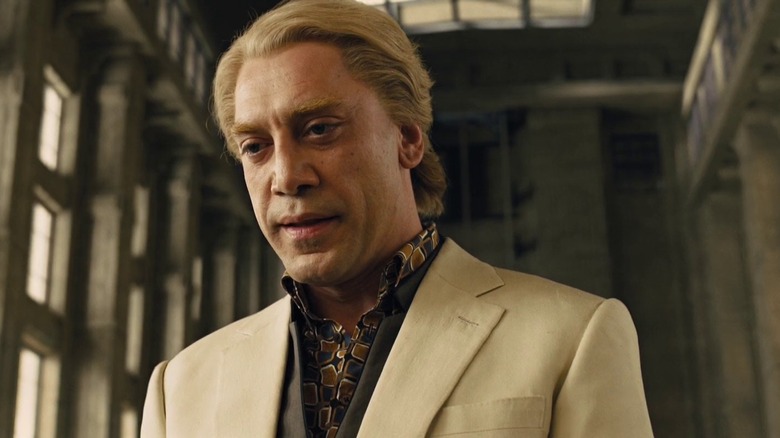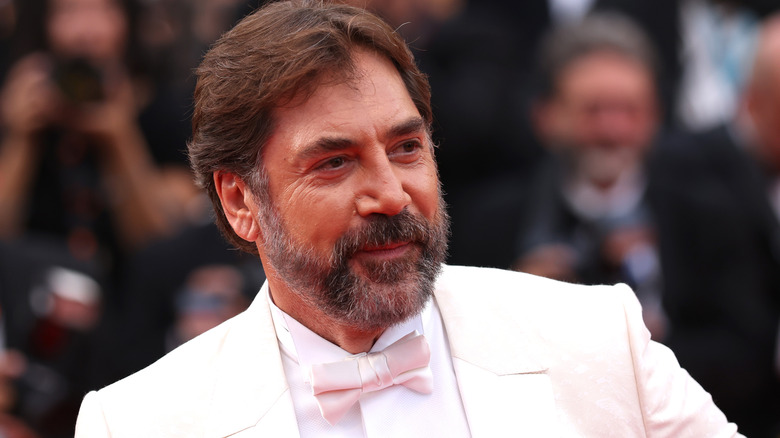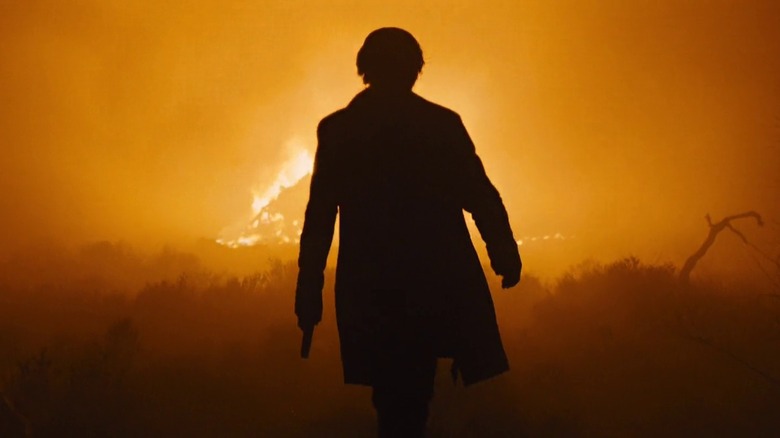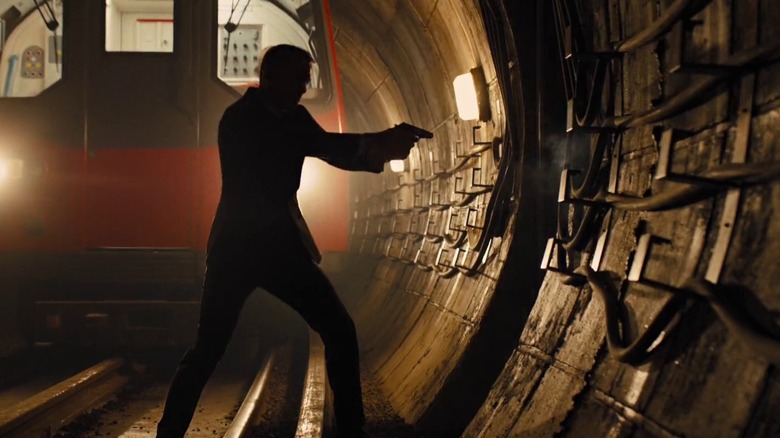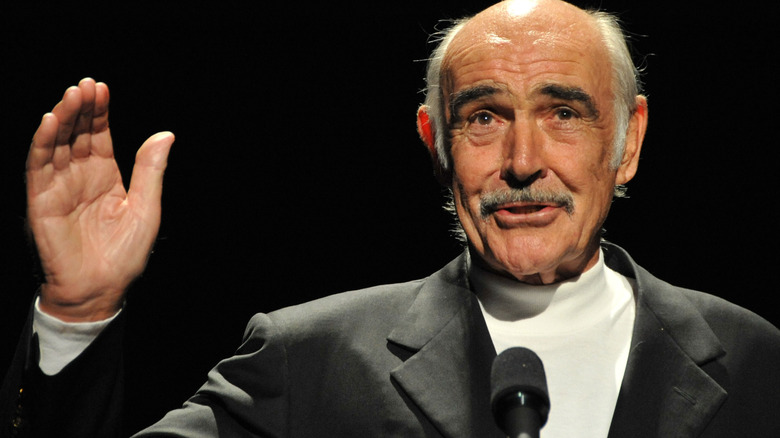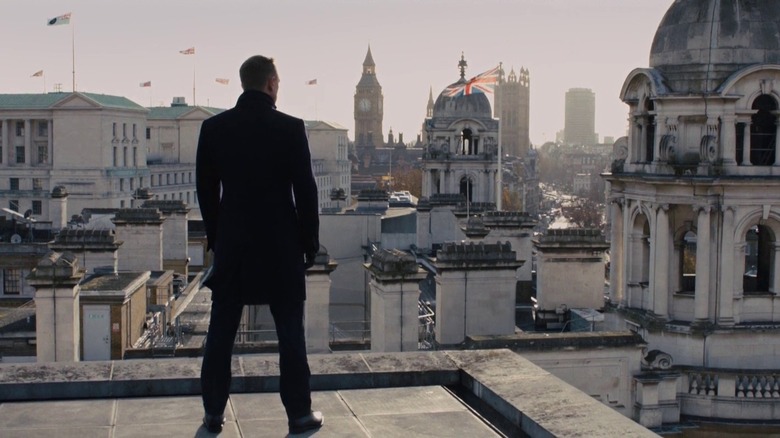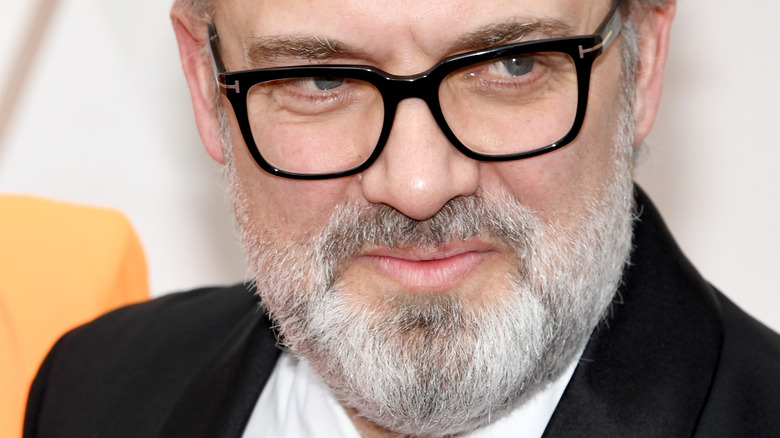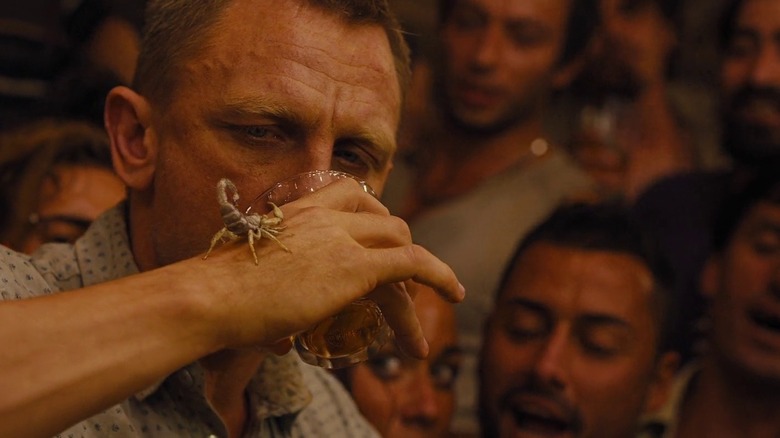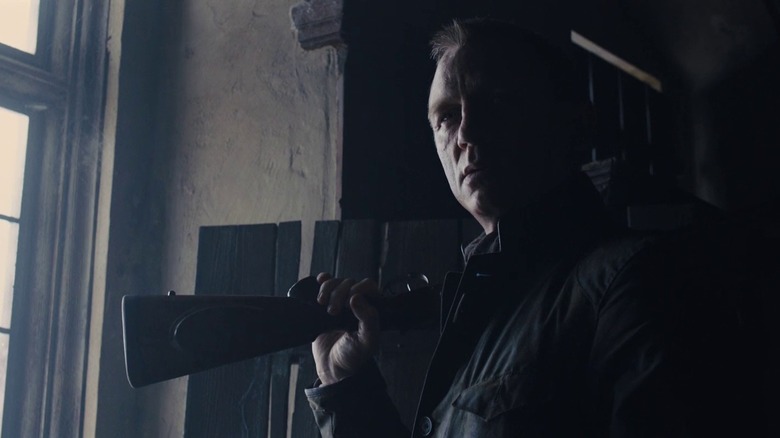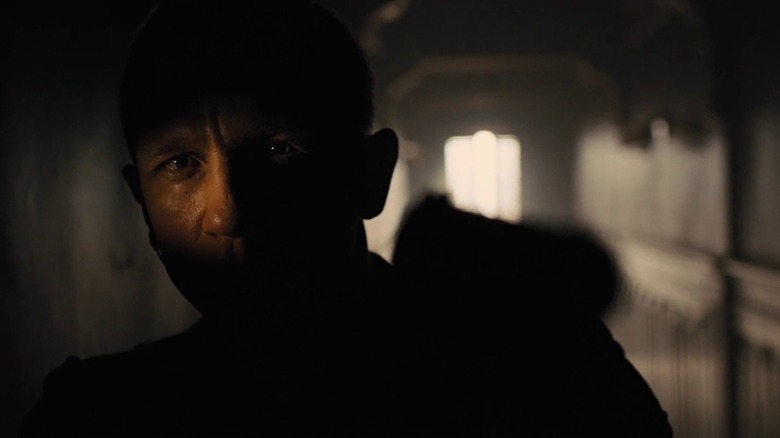Skyfall: The Complicated History Behind Daniel Craig's Third Run As Bond
The James Bond franchise has been producing new installments regularly since 1962, when "Dr. No" graced movie theaters. Not everything has been hunky-dory for this iconic string of spy movies since then, but more often than not, the saga has navigated evolving tastes and bold recasts to constantly deliver box office hits. The successful streak of these films hit its 50th year with "Skyfall," Daniel Craig's third film as 007 which would go on to become an especially popular entry in the franchise. Despite being a success in every conceivable manner, it wasn't a walk in the park to bring "Skyfall" to the silver screen.
The lengthy history of bringing this movie to life speaks to countless real-world challenges that constantly delivered new roadblocks for the production, while also reinforcing the dedication that artists like Craig and director Sam Mendes brought despite all of the obstacles. This history also captures the very unique and exciting creative ambitions of this installment in the series, including Craig's desire to make "Skyfall" a lighter entry in his tenure as James Bond. Though "Skyfall" faced more issues than many other Bond features, the history behind the movie's existence is rife with fascinating details. In the end, it's hard not to appreciate how well "Skyfall" turned out despite everything working against it.
The MGM bankruptcy delayed Skyfall
Considering how lucrative the "James Bond" movies are, it would seem like all it would take is snapping one's fingers and writing up a check to get a new installment made. Unfortunately, this franchise is forever intertwined with MGM, a film studio whose financial woes have often impacted the production. MGM's budget status especially impacted Bond in early 2010, when pre-production on "Skyfall," then only known as the 23rd James Bond movie, was halted in response to the studio's bankruptcy (per Deadline).
At the time of this uncertainty, rumors flew that EON Productions, which owns the underlying rights to the James Bond franchise, was navigating this whole situation very carefully, especially since there was a potential outcome within the bankruptcy for them to take the James Bond series to another studio. Not wanting to do anything rash in these circumstances, all work on "Skyfall" ground to a halt. Patience ended up serving EON well in this case, as MGM's financial issues were cleared up enough by November 2010 for pre-production to resume and even for "Skyfall" to get a November 2012 release date (via Hindustan Times). While this situation ended up working itself out, the future of James Bond on the big screen was briefly riddled with uncertainty thanks to the MGM bankruptcy.
How Sam Mendes got involved in Skyfall
The story of how Sam Mendes became attached to "Skyfall" began at a birthday party. Mendes and Daniel Craig were attending a birthday celebration for Hugh Jackman in New York City, with the event serving as a reunion for the two artists after they worked together on the 2002 film "Road to Perdition." Craig recalled to The Hollywood Reporter that the duo began chatting about general matters before Mendes offered up kind remarks about "Casino Royale," which led their conversation to turn to the future of the Bond franchise. Craig had some hopes for lighter 007 adventures compared to his first two outings, and that's when Mendes began to pitch his ideas for what a new Bond film could entail.
The two, a bit tipsy after drinking heavily that evening, were suddenly becoming quite passionate about the idea of working together on a new Bond movie, which is when Craig suggested that Mendes serve as a director on the forthcoming project. The following day, Craig, in a more sober state, rang up the producers of the franchise to let them know this exchange had happened. To his shock, they were excited by the idea of Mendes doing the film, and it wasn't long before the filmmaker was officially signed on for the blockbuster that would become "Skyfall." Who could've imagined that such a casual birthday party conversation would lead to a director snagging this big of a filmmaking opportunity?
Mendes almost backed out of Skyfall
While Sam Mendes was involved from a very early stage in the inner machinations of "Skyfall," there was a point where it looked like he might back out of the project altogether. Talking to The Hollywood Reporter in 2012, Mendes recalled how his trepidation over helming "Skyfall" didn't stem from concern over pulling off a big action movie or concerns about living up to fan expectations. Instead, his worries were entirely about the MGM bankruptcy. With this event halting everything related to "Skyfall," uncertainty lingered over the project. With so many key elements regarding financing and distribution up in the air, Mendes did consider leaving the project altogether.
His concerns grew so great that Mendes even contemplated tackling other big directorial efforts, including the inaugural installment of "The Hunger Games." However, Mendes opted to hold onto hope that everything with MGM's finances would be resolved quickly, and remained committed to "Skyfall." His dedication to this motion picture was further enhanced by the refining that he and the film's screenwriters did on the "Skyfall" script while they waited around for the project's financial future to get sorted out. Enduring through those moments of doubt, Sam Mendes proved thoroughly onboard with everything related to "Skyfall."
The rumored title for Skyfall
There's always endless speculation about a new James Bond movie before it debuts, and this is especially true regarding titles. The various installments in the Bond franchise have had some of the most striking names in the history of blockbuster cinema, like "Goldfinger" or "From Russia with Love." These monikers have stuck around in people's minds for decades, ensuring that there will always be lofty expectations and rampant speculation over the name of each new entry in the canon.
The passionate interest that the public has in this topic was on full display in August 2011, when the internet was gripped with debate over the potential title for the then-untitled "Bond 23." The project was rumored to be titled "Carte Blanche," with websites like IndieWire breaking down the various reasons why this would be only logical for the next 007 adventure (including that it was the title for the then-most recent novel starring the character). The proposed title seemed extra believable after 2008's "Quantum of Solace," which carried a ludicrous title that suggested anything could be on the table in terms of what a James Bond movie could be called. All the speculation on the "Carte Blanche" title turned out to be for naught, though, as the movie would be revealed to be officially called "Skyfall" a few months later.
How Javier Bardem got involved with Skyfall
Javier Bardem's extensive filmography ranges wildly from tiny indies to some of the biggest blockbusters on the planet, not to mention playing one of the most memorable characters in the Coen Brothers' Best Picture winner "No Country for Old Men." One of the most unforgettable figures he's ever played is Silva, his villainous role in "Skyfall." Allowed to be a bit more over-the-top than the previous adversaries in Daniel Craig's Bond movies, Bardem thrives at being both entertaining and genuinely menacing whenever he's on-screen. It's a role Bardem excels in, so it's no surprise that he was always the top choice for the part among key people involved in "Skyfall."
Bardem explained to Den of Geek that Daniel Craig had approached him at a glossy event to gauge his interest in appearing in a James Bond feature that he and Sam Mendes were tinkering away on. Craig was a total stranger to Bardem at this point, but the latter actor got such a good vibe from Craig that he was immediately intrigued by the prospect of joining the feature. Later, Bardem would receive the script for "Skyfall," and after removing from his mind all the external factors of the franchise's legacy, he found himself captivated by its story and characters. From there, Bardem did not doubt that he would be playing Silva in "Skyfall," a decision that proved to be a boon for moviegoers everywhere.
Did Bardem take real-world inspiration for performing Silva?
No movie performance is built in a vacuum. All actors are drawing from pre-established sources to concoct their vision for how a certain character should behave. Perhaps they're taking inspiration from real-life people they've known, or famous world leaders who have relevant personality traits. James Bond movies like "Skyfall" occupy a heightened version of reality full of speedy cars, futuristic gadgets, and spies enduring pain that would instantly kill most humans. But even here, the actors tasked with portraying such larger-than-life characters still need a relatable touchstone to ground their performance.
This is just as true for Javier Bardem's Silva as any other character in the 007 canon, though the actor clarified to Den of Geek that no single person was the sole inspiration for the villain. Bardem did admit that he and Sam Mendes looked at an assortment of people to inform the physicality of Silva, but in the end, the performance drew more from the concept of conveying constant discomfort than having him be a caricature of one specific person. While Bardem didn't make Silva a pastiche of any politician or actors, that emphasis on communicating tangible pain in his performance still speaks to the human grounding needed to make even the most grandiose performances believable to viewers.
Roger Deakins and his evolving attitude about Skyfall in IMAX
With "Skyfall," the James Bond franchise was going somewhere it had never gone before: IMAX. Despite existing since 1962, none of the various 007 features had ever been projected in IMAX auditoriums until "Skyfall" (via The Hollywood Reporter). This development signaled just how important IMAX showings were becoming to movie studios by 2012, while it also heralded how much of an event "Skyfall" was. However, a key behind-the-scenes figure was far from pleased about the movie getting shown in this format. Cinematographer Roger Deakins was initially apprehensive about the decision to project "Skyfall" in IMAX theaters.
This wasn't because of Deakins having an innate contempt for IMAX screens, though. The prolific cinematographer explained to Arri that the decision to release "Skyfall" in IMAX came after he'd decided to capture the movie with ALEXA cameras. Initially, footage from "Skyfall" didn't look right when projected in IMAX, especially in terms of the colors. The problem here, though, turned out to be a process of enhancing images for IMAX screens by IMAX. Once the "Skyfall" footage was projected without being "enhanced" first, Deakins thought it looked splendid in the premium format. It took him a while to get there, but Deakins eventually wholly supported "Skyfall's" historic run in IMAX auditoriums.
Sean Connery's abandoned Skyfall cameo
Sean Connery's legacy in the James Bond franchise is immeasurable. The first man to ever play this superspy on the silver screen, Connery immediately became an icon through his calm and assured interpretation of this character. While others would follow in his footsteps admirably, his shadow would loom large over the franchise forever more. The producers of "Skyfall" initially conceived of a way to pay homage to his enormous creative legacy by giving Connery the chance to make a cameo appearance in the movie, which would be released during the 50th anniversary of Connery's first outing as 007, 1962's "Dr. No."
Sam Mendes revealed to The Huffington Post that there were talks of having Connery show up as Kincade, the gamekeeper who tends to the Skyfall estate where James Bond grew up. However, Mendes was extremely apprehensive about this idea, primarily because the presence of Connery in a Bond movie would doubtlessly distract audiences. Wanting to make sure "Skyfall" had a chance of impressing audiences on its own merits, the proposed Connery cameo was ditched. Instead, the role of Kincade was filled by another legendary silver screen star, Albert Finney. Even if he didn't return in "Skyfall," though, Connery's enduring legacy in the world of James Bond remains undisputed.
How Thomas Newman adjusted to scoring an action movie
Thomas Newman has worked as a film composer since 1994 and in that time, he's delivered scores for a wide variety of movies. From "The Shawshank Redemption" to "Finding Nemo," Newman's worked under filmmakers ranging from Costa-Gavras to Todd Field. However, his work in "Skyfall" provided extra challenges for Newman, and not just because he was entering one of the most beloved movie franchises in history. This would also be his first time scoring a pure action movie, a genre that made new creative demands of Newman.
Newman said to Assignmentx that he'd never considered scoring an action movie because he was worried that the identity of the composer would be lost against all the explosions and gunshots that tend to populate action films. However, once he heard that Sam Mendes, with whom he'd worked on multiple prior occasions, was doing "Skyfall," Newman knew he had to finally dive in. Once he was composing the music for "Skyfall," he found it to be a fine exercise thanks to Mendes giving him creative space and the fact that he didn't grow up a diehard James Bond devotee. The latter element ensured that he wasn't intimidated by expectations over living up to the creative legacy of the franchise. Instead, he could just follow his own impulses and explore the prospect of scoring an action film for the first time.
Sam Mendes felt Skyfall was a personal film
An understandable concern for any filmmaker undertaking a big blockbuster in a pre-established franchise is whether or not they'll be able to leave any kind of personal stamp as an artist. Institutions like the Bond movies have so many expectations to live up to, and juggling all that can sometimes mean that the voice of the director handling everything gets suffocated in the process. Sam Mendes, a veteran of darker dramas like "American Beauty," could've easily had his identity as a filmmaker swallowed by the gigantic machine used to bring James Bond films to life. But once the whole feature was finished and in the can, Mendes was proud of just how deeply personal he'd been able to make this blockbuster.
Mendes explained to Den of Geek that he didn't think "Skyfall" was any different from his smaller independent directorial efforts in terms of how much ownership he felt over the final product. He attributed this to how the producers of the 007 saga are all about encouraging directors to explore their own creative passions rather than stifling them with all kinds of notes. With this kind of room to work creatively, Mendes was able to flourish and deliver a movie that, even while costing more than his earlier directorial efforts like "Away We Go," was still a deeply personal artistic endeavor.
The overt Britishness of Skyfall
The adventures of James Bond have resonated powerfully all over the world. The movies wouldn't be such box office juggernauts if they only appealed to one particular territory or audience. But there is a special fondness for the character in Britain, which isn't a surprise given the character's own nationality. While crafting "Skyfall," Sam Mendes, a filmmaker hailing from Britain, was very determined to keep the distinctly British qualities of the superspy alive and well even as he was crafting a movie made for a global audience.
"It's so English, and we don't do many things that are just us, you know?" Mendes said of the scale of "Skyfall" and the proclivities of British artists, respectively, to Den of Geek. "There we are, Abbey Road; iconic studio, iconic movie character. That's when you feel a responsibility, and nothing can prepare you for that. Also, I'm a Brit, and I came back to England to make an English movie, and it's about as English as you can get. To see that amount of knowledge and skill and craft in this country, when you see it en masse like that is quite overwhelming." Distinctly British artistry played no small part in cementing both Mendes' passion for "Skyfall" and the movie's own vital qualities.
Daniel Craig wanted to bring levity back to James Bond
The initial two James Bond movies anchored by Daniel Craig were extremely grim affairs. In keeping with the general aesthetic of big-budget blockbusters in the early 2000s, popularized by hits like "Batman Begins," 007 installments like "Casino Royale" and "Quantum of Solace" were content on dialing back the sillier elements of the Bond franchise in favor of gritty realism. It was a bold approach that certainly helped to redefine the superspy in the eyes of the public, and arguably helped to make him relevant to modern moviegoers. With "Skyfall," though, Craig was itching to return to some of the sillier aspects of classic Bond adventures.
Craig explained to Esquire that he and other key creative personnel on "Skyfall" agreed that this new iteration of James Bond had been around long enough to earn people's trust that they could engage in more lighthearted moments without lapsing into a full-blown parody. Craig also noted that the presence of acclaimed artists like director Sam Mendes and screenwriter John Logan gave him the confidence to occasionally explore the lighter side of James Bond at just the right moments throughout "Skyfall." After all, this is a franchise featuring characters with names like Pussy Galore — it can't be all grimness all the time.
The record-shattering box office run of Skyfall
Given how famous James Bond is, it may be surprising to know that none of the 007 movies managed to crack $450 million worldwide until 2006 with "Casino Royale." Of course, inflation plays a big role in this factoid (the 1964 installment "Goldfinger" made $124.9 million in its initial release, a sum that would be way bigger if inflation were accounted for), but regardless, the Daniel Craig era of the character took 007 past the $500 million mark globally for the first time. There was already a lot to crow about regarding the box office might of this incarnation of the character, but things got even better once "Skyfall" rolled into theaters in 2012.
Arriving during the 50th anniversary of Bond's first movie, "Dr. No," "Skyfall" was poised to be a hit, but nobody could imagine just how massive it would end up being. In its theatrical run, "Skyfall" grossed $1.11 billion worldwide, including a staggering $304.3 million in North America. By far the biggest entry in this franchise by any measure, "Skyfall" went straight into the history books as the first-ever movie released by Sony/Columbia Pictures to exceed $1 billion worldwide (per The Hollywood Reporter). This impressive feat spoke to how much good word-of-mouth "Skyfall" generated among the general public while timing the movie to such an important anniversary for the James Bond character was a stroke of genius. In every way you can imagine, "Skyfall" was a hit as big as James Bond's cultural influence.
